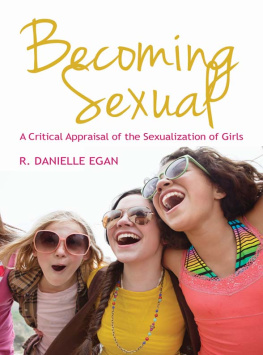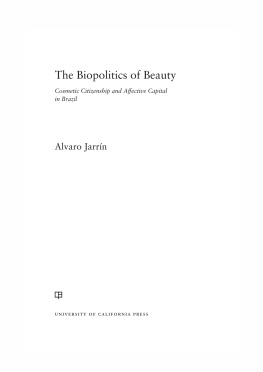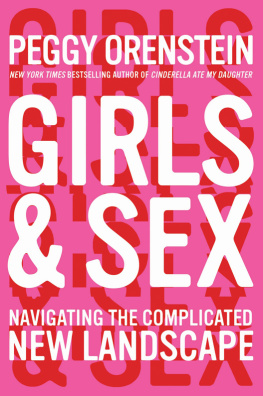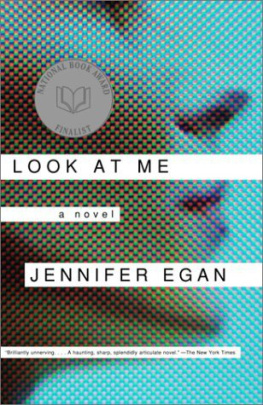Becoming Sexual
For Stephen Pfohl an amazing professor and dear friend, whose wisdom and unfailing kindness always make all the difference.
Copyright R. Danielle Egan 2013
The right of R. Danielle Egan to be identified as Author of this Work has been asserted in accordance with the UK Copyright, Designs and Patents Act 1988.
First published in 2013 by Polity Press
Polity Press
65 Bridge Street
Cambridge CB2 1UR, UK
Polity Press
350 Main Street
Malden, MA 02148, USA
All rights reserved. Except for the quotation of short passages for the purpose of criticism and review, no part of this publication may be reproduced, stored in a retrieval system, or transmitted, in any form or by any means, electronic, mechanical, photocopying, recording or otherwise, without the prior permission of the publisher.
ISBN 978-0-7456-6958-8
A catalogue record for this book is available from the British Library.
The publisher has used its best endeavors to ensure that the URLs for external websites referred to in this book are correct and active at the time of going to press. However, the publisher has no responsibility for the websites and can make no guarantee that a site will remain live or that the content is or will remain appropriate.
Every effort has been made to trace all copyright holders, but if any have been inadvertently overlooked the publisher will be pleased to include any necessary credits in any subsequent reprint or edition.
For further information on Polity, visit our website: www.politybooks.com
Acknowledgments
Over the past three years, I have sought out numerous conversation partners and devils advocates while working through an idea or line of reasoning. Most often, the conversation starts with the confused plea, I am trying to get my head around this, do you have a minute? Nine times out of ten, the person on the other line (phone or email) has said, Absolutely; they have given their time generously and pushed my thinking farther. Clearly, I am a very privileged woman. Feona Attwood, Lani Brunson, John Collins, Erin McCarthy, Stephen Pfohl, Liz Regosin, Emma Renold, Jessica Ringrose, Allen Shelton, Natalia Singer, Mary Jane Smith, Clarissa Smith, and Eve Stoddard have been particularly generous. Conversations with Barbara Baird, Sue Jackson, Keri Lerum, Susie Orbach, Juliet Schor, and Lisbet van Zoonen are also much appreciated.
The many years of friendship and intellectual collaboration with Gail Hawkes indelibly mark this book and my life in ways untold. Quite simply, Becoming Sexual would not have been possible without the work Gail and I did for Theorizing the Sexual Child.
Writing is a solitary business. All too often it takes me away from the people I love on weekends, holidays, and breaks from teaching a special thank you to my family and friends who have been nothing but patient, loving, and supportive.
This book came into being as I began my training as a psychoanalyst at the Boston Graduate School of Psychoanalysis (BGSP). Although there were numerous times when I thought writing a book at the beginning of my clinical training and in the midst of my teaching was ill advised, to say the least, I do believe that the book is all the richer for it. The generative space created in my seminars with Dr Siamek Movahedi, Dr Mara Wagner, Dr Lynn Perlman, Dr Jane Snyder, and Dr John Madonna deepened my thinking and feeling on this topic and many others. The razor-sharp mind and important questions posed by Dr Stephen Soldz have been incredibly illustrative and kept me going back to the data.
Mark McClellands generous invitation to present at the University of Wollongong was pure pleasure. The provocative conversations that took place as a result were particularly helpful. Emma Renolds invitation to give a lecture at the University of Cardiff and to be a part of a larger conversation on sexualization with Gail Hawkes, Jessica Ringrose, Valerie Walkerdine, Debbie Epstein, Rosalind Gill, Feona Attwood, Sara Bragg, Meg Barker, Laura Harvey, Robert Duschinsky, and numerous others felt, and still feels, like winning the lottery. Rarely does the door of opportunity open twice, but the conference Pornified? Complicating Debates about the Sexualization of Culture organized by Jessica Ringrose, Emma Renold, Meg Barker, and Rosalind Gill was equally invaluable. It was, by far, one of the best conferences I have had the pleasure to attend. My thinking on class and sexualization was deepened by the excellent questions posed during my talk for the Boston College Sociology Department, a place near and dear to my heart. I have had the pleasure of working with a group of smart, curious, brave, innovative, funny, activist-oriented, and badass students in Gender and Sexuality Studies at St. Lawrence University my scholarly journey is inextricably tied to the work we do in the classroom, and for that I feel very lucky.
Through it all I have had the pleasure of working with a smart, passionate, and incredibly detail-oriented research assistant, Jonathan Stopyra. His calm in the face of increasingly complicated requests for various demographic studies from three countries and sources to be added to the bibliography was awe-inspiring. If there was an MVP award for research assistance, he would get one!
Working with Polity has been pure pleasure. The support, guidance, and gentle nudging from my editor, Jonathan Skerrett, has been invaluable and much appreciated. At various times when this project felt like it would never come together, Jonathans emails always soothed, clarified, and motivated. This book has been a labor of love. The team at Polity always made it clear that it was in good hands. For that I am incredibly grateful.
Words fail to adequately describe how lucky I feel about having Stephen Papson in my life. A brilliant interlocutor who always asks compelling and challenging questions and a caring partner who takes on all household responsibilities when I am anchored to the computer; who could ask for anything more? Your intellect, kindness, and care continue to astound me after all these years; Steve you are truly one of a kind.
Introduction:
Sexualization as a Social Problem
Children and young people today are not only exposed to increasing amounts of hyper-sexualized images, they are also sold the idea that they have to look sexy and hot. As such they are facing pressures that children in the past simply did not have to face. As children grow older, exposure to this imagery leads to body surveillance, or the constant monitoring of personal appearance. This monitoring can result in body dissatisfaction, a recognized risk factor for poor self-esteem, depression and eating disorders. Indeed, there is a significant amount of evidence that attests to the negative effects of sexualization on young people in terms of mental and physical health, attitudes and beliefs.
Linda Papadopoulos (2010), Sexualization of Young People Review: 35
If girls learn that sexualized behavior and appearance are approved of and rewarded by society and by the people (e.g., peers) whose opinions matter most to them, they are likely to internalize these standards, thus engaging in self-sexualization.
American Psychological Association (2007) APA Task Force Report on the Sexualization of Girls: 2
After reading the quotes above, one comes away with a clear and unequivocal warning: sexualization is a ubiquitous force infecting the lives of girls. Sexualization, according to the American Psychological Association (APA) Task Force, results when any of the following four conditions have been met:
a persons value comes only from his or her sexual appeal or behavior, to the exclusion of other characteristics; a person is held to a standard that equates physical attractiveness (narrowly defined) with being sexy; a person is sexually objectified that is, made into a thing for others sexual use, rather than seen as a person with the capacity for independent action and decision making; and/or sexuality is inappropriately imposed upon a person (APA 2007: 1).









